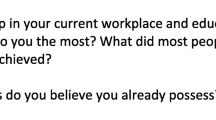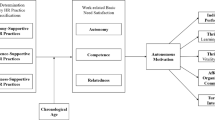Abstract
Leadership is one of the skills necessary for the career of future health professionals. The purpose of this study is to get an insight into developing leadership skills in online learning as well as ways to deal with various management issues. The methods used in this study include a survey, quantitative and qualitative analysis, and statistical data processing. The research conducted among medical students suggests that a leader is identified by behavioral, cognitive personality traits, and physical qualities. Online learning creates an inclusive environment, as well as directly prepares the ground for gaining leadership. Such format of learning reduces society’s pressure regarding the molding of personality. The implications of the study are based on the development of tools for addressing leadership and management issues in online learning. It aims to demonstrate the benefits of online learning and show facets of leadership that are worth paying attention to.


Similar content being viewed by others
Data availability
Data will be available on request.
References
Allen, I. E., & Seaman, J. (2017). Digital compass learning: Distance education enrollment report 2017. Babson Survey Research Group.
Al-Mosawi, A. J. (2019). Leadership in medicine and healthcare: An overview of the emerging concepts and principles. Lupine Online Journal of Medical Sciences, 4(1), 344–351. https://doi.org/10.32474/LOJMS.2019.04.000179
Beaudoin, M. F. (2015). Distance education leadership in the context of digital change. Quarterly Review of Distance Education, 16(2), 33–44.
Becker, S. A., Cummins, M., Davis, A., Freeman, A., Hall, C. G., & Ananthanarayanan, V. (2017). NMC Horizon Report: 2017 Higher Education Edition. The New Media Consortium.
Beketova, E., Leontyeva, I., Zubanova, S., Gryaznukhin, A., & Movchun, V. (2020). Creating an optimal environment for distance learning in higher education: Discovering leadership issues. Palgrave Communications, 6(1), 66. https://doi.org/10.1057/s41599-020-0456-x
Bokayev, B., Torebekova, Z., Davletbayeva, Z., & Zhakypova, F. (2021). Distance learning in Kazakhstan: Estimating parents’ satisfaction of educational quality during the coronavirus. Technology, Pedagogy and Education, 30(1), 27–39. https://doi.org/10.1080/1475939X.2020.1865192
Bradbury, B., & Suarez-Sousa, X. (2019). A mixed methods study of distance learning graduate students’ motivation and program satisfaction at an American State University. In E. V. Kondratyonok (Ed.), VII international scientific and technical internet conference “information Technologies in Education, science and production”, 2019 (pp. 11–15). Belarusian National Technical University.
Bush, T., Bell, L., & Middlewood, D. (Eds.). (2019). Principles of Educational Leadership & Management. Sage.
Cabero-Almenara, J., Barroso-Osuna, J., Llorente-Cejudo, C., & Fernández Martínez, M. D. M. (2019). Educational uses of augmented reality (AR): Experiences in educational science. Sustainability, 11(18), 4990. https://doi.org/10.3390/su11184990
Caldwell, H. (2018). Mobile technologies as a catalyst for pedagogic innovation within teacher education. International Journal of Mobile and Blended Learning, 10(2), 50–65. https://doi.org/10.4018/IJMBL.2018040105
Chao, T. N., Frost, A. S., Brody, R. M., Byrnes, Y. M., Cannady, S. B., Luu, N. N., Rajasekaran, K., Shanti, R. M., Silberthau, K. R., Triantafillou, V., & Newman, J. G. (2021). Creation of an interactive virtual surgical rotation for undergraduate medical education during the COVID-19 pandemic. Journal of Surgical Education, 78(1), 346–350. https://doi.org/10.1016/j.jsurg.2020.06.039
Clarke, S., & O’Donoghue, T. (2017). Educational leadership and context: A rendering of an inseparable relationship. British Journal of Educational Studies, 65(2), 167–182. https://doi.org/10.1080/00071005.2016.1199772
Cordie, L., & Lin, X. (2018). The e-revolution in higher education: E-learning and e-leaders. Journal of Leadership Studies, 12(3), 76–78. https://doi.org/10.1002/jls.21602
De Gagne, J. C., Park, H. K., Hall, K., Woodward, A., Yamane, S., & Kim, S. S. (2019). Microlearning in health professions education: Scoping review. JMIR Medical Education, 5(2), e13997. https://doi.org/10.2196/13997
Duning, B. (1990). The literature of management. In Contemporary issues in American distance education (pp. 30–43). Pergamon Press.
Eacott, S. (2015). Educational leadership relationally: A theory and methodology for educational leadership, management and administration. Sense Publishers.
Edelman, P., & van Knippenberg, D. (2018). Emotional intelligence, management of subordinate’s emotions, and leadership effectiveness. Leadership & Organization Development Journal, 39(5), 592–607. https://doi.org/10.1108/LODJ-04-2018-0154
Hardy, J. G., Sdepanian, S., Stowell, A. F., Aljohani, A. D., Allen, M. J., Anwar, A., Barton, D., Baum, J. V., Bird, D., Blaney, A., Brewster, L., Cheneler, D., Efremova, O., Entwistle, M., Esfahani, R. N., Firlak, M., Foito, A., Forciniti, L., Geissler, S. A., et al. (2021). Potential for chemistry in multidisciplinary, interdisciplinary, and transdisciplinary teaching activities in higher education. Journal of Chemical Education, 98(4), 1124–1145. https://doi.org/10.1021/acs.jchemed.0c01363
Hoang, G., Wilson-Evered, E., Lockstone-Binney, L., & Luu, T. T. (2021). Empowering leadership in hospitality and tourism management: A systematic literature review. International Journal of Contemporary Hospitality Management, 33(12), 4182–4214. https://doi.org/10.1108/IJCHM-03-2021-0323
Hudson, L., Mahendrarajah, S., Walton, M., Pascaris, M. J., Melim, S., & Ruttenberg-Rozen, R. (2021). Leadership in education during COVID-19: Learning and growing through a crisis. Journal of Digital Life and Learning, 1(1), 16–33. https://doi.org/10.51357/jdll.v1i1.113
Jandigulov, A. R., & Tlepbai, K. (2018). Online learning of discrete mathematics. In Mathematicians to Altai Krai: Proceedings of the Russian Nationwide and International Conference on Mathematics, 2018 (pp. 238–240). Altai University Press.
Kara, M., Erdogdu, F., Kokoç, M., & Cagiltay, K. (2019). Challenges faced by adult learners in online distance education: A literature review. Open Praxis, 11(1), 5–22. https://doi.org/10.5944/openpraxis.11.1.929
Karadağ, E., Bektaş, F., Çoğaltay, N., & Yalçın, M. (2015). The effect of educational leadership on students’ achievement: A meta-analysis study. Asia Pacific Education Review, 16(1), 79–93. https://doi.org/10.1007/s12564-015-9357-x
Karadenız, A. (2018). Administrative leadership in open and distance learning programs. Turkish Online Journal of Distance Education, 19(2), 215–217.
Kromydas, T. (2017). Rethinking higher education and its relationship with social inequalities: Past knowledge, present state and future potential. Palgrave Communications, 3(1), 1–12. https://doi.org/10.1057/s41599-017-0001-8
Kuscu, M., & Arslan, H. (2016). Virtual leadership at distance education teams. Turkish online journal of. Distance Education, 17(3), 10. 10.17718/tojde.79230.
Lerman, C., & Jameson, J. L. (2018). Leadership development in medicine. New England Journal of Medicine, 378(20), 1862–1863. https://doi.org/10.1056/nejmp1801610
Liu, S., Glowatz, M., Zappatore, M., Gao, H., Jia, B., & Bucciero, A. (2018). E-learning, e-education, and online training. Springer International Publishing.
Locatelli, V., & West, M. A. (1996). On elephants and blind researchers: Methods for accessing culture in organizations. Leadership & Organization Development Journal, 17(7), 12–21. https://doi.org/10.1108/01437739610148330
Minehart, R. D., Foldy, E. G., Long, J. A., & Weller, J. M. (2020). Challenging gender stereotypes and advancing inclusive leadership in the operating theatre. British Journal of Anaesthesia, 124(3), 148–154. https://doi.org/10.1016/j.bja.2019.12.015
Moonsamy, D., & Govender, I. (2018). Use of blackboard learning management system: An empirical study of staff behavior at a south African University. EURASIA Journal of Mathematics, Science and Technology Education, 14(7), 3069–3082. https://doi.org/10.29333/ejmste/91623
Moore, J. M., Wininger, D. A., & Martin, B. (2016). Leadership for all: An internal medicine residency leadership development program. Journal of Graduate Medical Education, 8(4), 587–591. https://doi.org/10.4300/jgme-d-15-00615.1
Olcott, D. (2020). In search of leadership: Practical perspectives on leading distance education organisations. Asian Journal of Distance Education, 15(2), 48–57.
Oliveira, P. C. D., Cunha, C. J. C. D. A., & Nakayama, M. K. (2016). Learning management systems (LMS) and e-learning management: An integrative review and research agenda. Journal of Information Systems and Technology Management, 13, 157–180. https://doi.org/10.4301/s1807-177520160002000001
Owusu-Agyeman, Y. (2021). Transformational leadership and innovation in higher education: A participative process approach. International Journal of Leadership in Education, 24(5), 694–716. https://doi.org/10.1080/13603124.2019.1623919
Perraton, H. (2020). A theory for distance education. In Distance education: International perspectives (pp. 34–45). Routledge. https://doi.org/10.1201/9781003033950-4
Purwanto, A., Asbari, M., Fahlevi, M., Mufid, A., Agistiawati, E., Cahyono, Y., & Suryani, P. (2020). Impact of work from home (WFH) on Indonesian teachers performance during the Covid-19 pandemic: An exploratory study. International Journal of Advanced Science and Technology, 29(5), 6235–6244.
Puspitasari, K. A., & Oetoyo, B. (2018). Successful students in an open and distance learning system. Turkish Online Journal of Distance Education, 19(2), 189–200. https://doi.org/10.17718/tojde.415837
Sadowski, B., Cantrell, S., Barelski, A., O'Malley, P. G., & Hartzell, J. D. (2018). Leadership training in graduate medical education: A systematic review. Journal of Graduate Medical Education, 10(2), 134–148. https://doi.org/10.4300/JGME-D-17-00194.1
Saint-Michel, S. E. (2018). Leader gender stereotypes and transformational leadership: Does leader sex make the difference? Management, 21(3), 944–966. https://doi.org/10.3917/mana.213.0944
Sangrà, A., & Cleveland-Innes, M. F. (2020). Leadership in a new era of higher distance education. In An introduction to distance education (pp. 149–167). Routledge. https://doi.org/10.4324/9781315166896-12
Shaturaev, J., & Bekimbetova, G. (2021). The difference between educational management and educational leadership and the importance of educational responsibility. In Scientific horizon in the context of social crises (Vol. 88, pp. 68–88). InterConf.
Simpson, O. (2018). Supporting students in online, open and distance learning. Routledge.
Suradi, Z., Baqwir, J. A. M., & Yusoff, N. H. (2018). Factors affecting the use of Moodle system among students in Dhofar University. International Journal of Management and Applied Science, 4(10), 56–59.
Vasconcelos, M. C. C. (2017). Education at home: Unschooling prospects or freedom of choice? Pro-Posições, 28(2), 122–140. https://doi.org/10.1590/1980-6248-2015-0172
Wowk, K., McKinney, L., Muller-Karger, F., Moll, R., Avery, S., Escobar-Briones, E., Yoskowitz, D., & McLaughlin, R. (2017). Evolving academic culture to meet societal needs. Palgrave Communications, 3(1), 35. https://doi.org/10.1057/s41599-017-0040-1
Author information
Authors and Affiliations
Corresponding author
Ethics declarations
Conflict of interest
The authors report there are no competing interests to declare.
Additional information
Publisher’s note
Springer Nature remains neutral with regard to jurisdictional claims in published maps and institutional affiliations.
Rights and permissions
Springer Nature or its licensor (e.g. a society or other partner) holds exclusive rights to this article under a publishing agreement with the author(s) or other rightsholder(s); author self-archiving of the accepted manuscript version of this article is solely governed by the terms of such publishing agreement and applicable law.
About this article
Cite this article
Jandigulov, A., Abdallah, A.K., Tikhonova, Y. et al. Management and leadership in online learning. Educ Inf Technol 28, 13423–13437 (2023). https://doi.org/10.1007/s10639-023-11699-4
Received:
Accepted:
Published:
Issue Date:
DOI: https://doi.org/10.1007/s10639-023-11699-4




